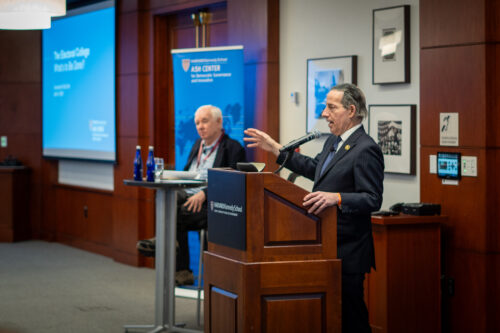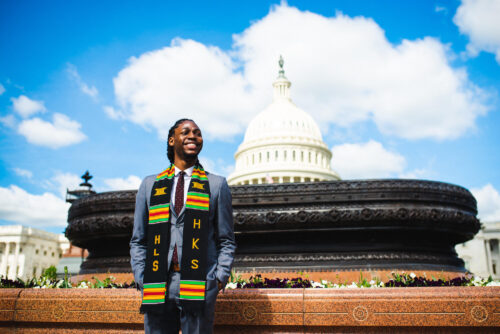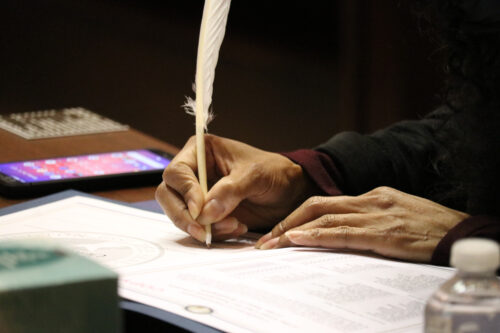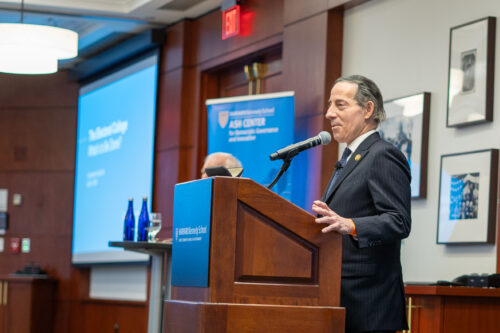
Feature
Moving beyond the Electoral College
At an Ash Center symposium on Electoral College reform, Congressman Jamie Raskin makes the case that the US should finally move to a direct popular vote for selecting presidential winners.
Feature
Mauzy Award-Winner Demarquin Johnson sees democratic action as the path to overcoming injustice and protecting voting rights
Demarquin Johnson HLS/HKS 2020 stepped up to a podium for the first time as a freshman in high school in Missouri City, Texas, as a member of his school’s debate team. After several weeks spent doing research, he was prepared to defend the right to vote for citizens convicted of a felony. Fueled by a deep belief that felony disenfranchisementis unjust and a legacy of Jim Crow-era attempts to strip voting rights from Black people, he hammered home how prohibiting people from voting because they were formerly incarcerated runs contrary to the American belief in democracy.
He won the debate.
His rhetorical skills and unwavering belief in justice and the power of democracy took him on to debate stages across the country and then on to Howard University, where he majored in political science. At “The Mecca,” as Howard is affectionately known by its students and alumni, Johnson wrote his undergraduate thesis on how a nonviolent, student-led racial justice campaign influenced the passage of the Voting Rights Act of 1965. This work, says Johnson, was, “a deep dive into how people create policy. And I mean, not just people that are elected to Congress, but people that are in communities across the country and living with the harms of ineffective and unfair laws, specifically in the voting rights field.”
After graduating from Howard, Johnson wanted to put his belief in people-powered voter reform to the test. He joined FairVote, an advocacy organization dedicated to electoral reforms, such as ranked-choice voting, an initiative that is before Massachusetts voters this November. Johnson worked with organizers in states like Oregon, Maine, and Maryland to push for changes to their state and local election laws that allowed for more free, fair, and representative elections. “Those were opportunities that really helped me understand how democracy is shaped at the grassroots level by community advocacy,” recalls Johnson.
His desire to continue fighting for voter rights and electoral reform is what ultimately led Johnson to Harvard. “I wanted to be able to gain a holistic perspective and develop and refine many different skills in the space of creating change,” says Johnson. He chose to attend both Harvard Law School and Harvard Kennedy School to gain a comprehensive understanding of voting rights jurisprudence, as well as to learn creative and unique approaches to crafting policy.
It may be a slow process. It can be a long process. It is often an ongoing process. Democracy has continuously been a way to create change and has been a way in which people have found themselves.![]()
Demarquin Johnson
HLS/HKS 2020
Twelve years after he first took the stage to defend a felon’s right to vote, Johnson became editor-in-chief of the Harvard Journal of African American Policy and published the journal’s issue on life after incarceration. Under his leadership, the journal centered on the voices of people who were currently and formerly incarcerated. “I’m very proud that we had people who are directly impacted sending us letters and contributing pieces for publication,” he says. “It is extremely important to make sure that people who are proximate to the pain, people who are proximate to the policy, have their voices heard.”
How we define our democracy and who we define as a citizen are questions that continue to drive Johnson. “There are plenty of examples throughout history and throughout the present in which people are marginalized by systems of oppression,” he notes. Yet, having seen for himself how governments and political actors still fight to disenfranchise citizens and push to make voting far more difficult than it should be, Johnson is unwavering in his belief that democratic reform represents the best path forward for ensuring all Americans have the opportunity to participate in and influence government.
“I think that we are able to see how individuals come together as a collective, put their ideas and their energy, skills, and strengths to work in order to manifest the world that they want to live in. And that’s the essence of democracy.” As much as America has a long history of oppressing and marginalizing groups and communities who represent the threat of change to the political status quo, “there’s also a long history of people winning. I can’t think of any examples in society where democracy doesn’t eventually win,” Johnson adds.
Recognized by his peers at HKS for his relentless commitment to democracy reform issues, Johnson received the 2020 Martha H. Mauzy Award for the Advancement of Democratic Governance, an honor given by the Ash Center to a Kennedy School student who demonstrates a unique commitment, through scholarship and practice, to making governance more participatory, transparent, responsive, or representative.
Quick to put his Harvard experience to work, Johnson joined the office of freshman Massachusetts Congresswoman Ayanna Pressley as a legislative assistant just a month after graduation, where he now handles voting rights, criminal justice reform, and healthcare policy issues for her office.
“It may be a slow process. It can be a long process. It is often an ongoing process. Democracy has continuously been a way to create change and has been a way in which people have found themselves,” Johnson says of his unfaltering belief in the promise of democracy. “And I’ll say in a way, I found joy.”
Feature
At an Ash Center symposium on Electoral College reform, Congressman Jamie Raskin makes the case that the US should finally move to a direct popular vote for selecting presidential winners.
Feature
During an opening panel at an Ash Center symposium on the future of the Electoral College, scholars examined the history behind how the US adopted its peculiar centuries-old system of choosing presidential election winners – and what should be done to reform or even abolish the practice today.
Video
Harvard-ID holders were invited to join the Ash Center for Democratic Governance and Innovation and the Institute of Politics for a conversation with Congressman Jamie Raskin (MD-08) about the future of the Electoral College.


